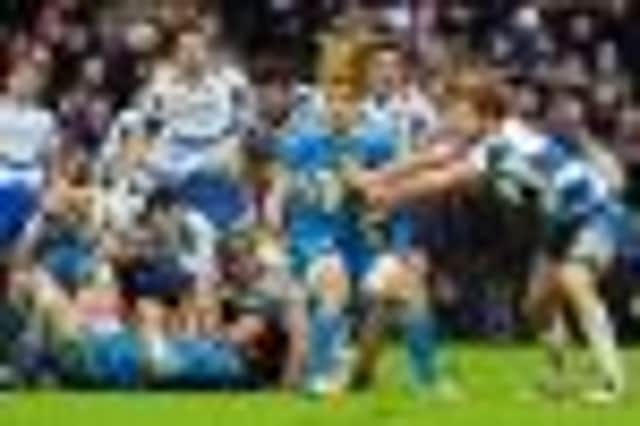Six Nations: Scotland’s change in fortune


Ryan spared us the technobabble, the science of the breakdown and the myriad problems that beset Scotland at Twickenham and immediately cut to the chase with a clinical detachment and a wounding honesty. It was the kind of thing that the grand old man of Melrose would call giving his players a “sharp dose of reality right between the f****** eyes!”
It wasn’t a rant, but the tone of it was stark. Ryan basically called his players willing and honest but hopelessly naïve in the kind of warfare required to win Six Nations Test matches, and not a soul in the land could have argued with him. He applauded their endeavour but buried them for their lack of street smarts and killer instinct.
Advertisement
Hide AdAdvertisement
Hide Ad“This Scottish team needs to engage with the fundamentals of any game, which is about winning the gainline.” It was like a mathematics professor telling a struggling student to go back and study the times tables.
A gamble, for sure. Here was Ryan, a blow-in from Sky Sports, a tourist just passing through, holding a mirror up to his forwards and telling them painful home truths. There are two ways that can go. For Scotland, it went the right way. From the first moments to the point of no return for the Italians it was clear that Scotland had not only gone back to basics but had devoured the manual.
The breakdown, the cause of so much angst last weekend, was transformed. Italy got no joy there, no easy momentum, no giant gaps through which they could launch the runners that did for France. In at the heart of this refound belligerence was the flame-haired wrecking ball, Rob Harley, the Glasgow man bringing the “pain in the arse” factor in the tight that was so woefully missing last Saturday. Scotland didn’t just win a game yesterday, they discovered a back-row forward that made you think of John Jeffrey at times. One mugging of Sergio Parisse in the Scotland 22 in the second half was classic JJ, a robbery committed from an offside position that went undetected by the referee. As the great man might say: “It ain’t cheating if you don’t get caught.”
Scotland played like a team that had suffered the ignominy of having their shorts pulled down in front of millions at Twickenham. Clearly, they didn’t appreciate the humiliation. How difficult it must have been for Kelly Brown in the past week, the captain, as proud as can be, looking lost amid the crisis. Brown is the leader for a reason, though. He didn’t get the job because his name was first out of the hat. On his best days he is a huge force and this was one of his better ones. In the first hour alone he’d made a dozen tackles, meeting Italian fire with a Scottish blowtorch.
His was an inspirational performance, a rallying cry to Johnnie Beattie, who was excellent again, and Richie Gray, who looked more like a Lion yesterday than he has done in a year. The forwards were the ones who won the war, the backs the guys who decided the scale of the carnage.
Truth be told, we did not expect this. There was talk beforehand about where the tag of favourites lay. By dint of their wondrous win over the French, there was a strong case to be made that Italy were the fancied ones, but isn’t this precisely the reason why this championship is such a joy, such a daredevil ride into the unknown?
For Scotland, this was new territory and a new sharpness. They were already ahead and hitting hard by the time Tim Visser scored, a product of quick ruck ball – praise the Lord – precise execution and a finish from Visser that not even the nearby Parisse could do anything about.
There were moments that defined Scotland’s aggression. Big moments and little moments, but all adding up to the same thing. Just after Visser’s score made it 13-0, Beattie and old warhorse Martin Castrogiovanni got into a contretemps, the Italian arm wrestling with the Scot and the Scot refusing to give an inch. At the end of it, big Castro gave Beattie a pat on the back as if to say: “Fair play, you’re not backing down, are you?” That attitude coursed through the Scottish team.
Advertisement
Hide AdAdvertisement
Hide AdTwickenham came to mind again. England scored their game-sealing try three minutes into the second half and Scotland did it just a minute later. A beautiful score it was, too; a slicing open of the Italian midfield defence by Sean Maitland and a gorgeous line taken by Matt Scott on his shoulder. Pass, try, game over. Scott’s role might not be shouted from the rooftops but he was excellent in attack and defence. He is a young centre with a big future.
And behind him there is another with a burgeoning reputation. Stuart Hogg managed to elevate himself above the shambles of last weekend and here again he was sniper-in-chief, a full-back with great anticipation, pace and finishing power. His intercept of Luciano Orquera was Hogg at his pocket-picking best. Easy scores don’t come easily to Scotland. What’s seldom is wonderful.
Scott almost had another before the end, but Sean Lamont made it a remarkable fourth when capitalising on the deterioration in the Italian ranks. Away he went for the posts, right arm in the air in celebration, maybe pointing the way ahead for this team. Maybe. Let’s not get emotional about it. But this was better. So much better.